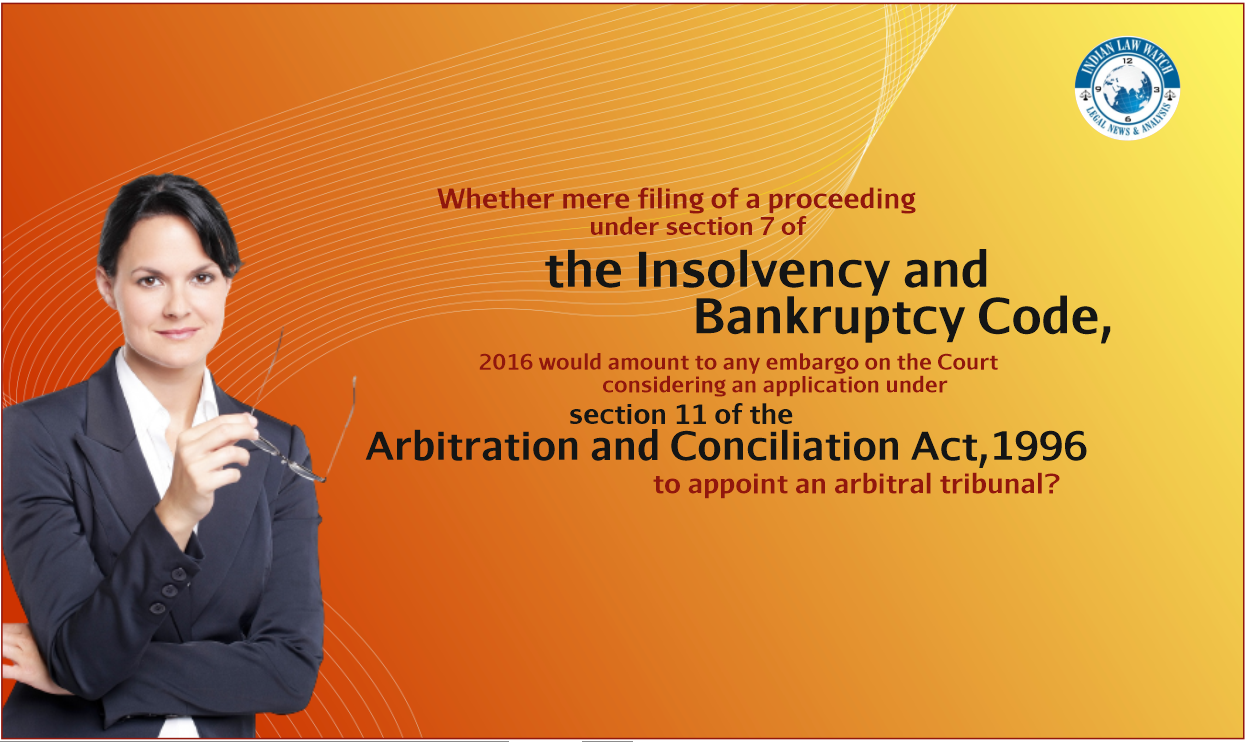
In Jasani Realty Pvt. Ltd. v. Vijay Corporation Commercial Arbitration Application (L) No. 1242 of 2022, the Bombay High Court held that an application filed under section 7 of the Insolvency and Bankruptcy Code, 2016 is not an embargo on the exercise of appointment of an arbitrator under section 11 of the Arbitration & Conciliation Act, 1996.

The respondent gave ₹ 4,50,00,000/- to the applicant as financial assistance and thereby, a loan agreement was concluded between the applicant and the respondent. Later, another agreement was entered between the applicant and the respondent wherein the date of repayment was extended from 30.06.2015 to 31.03.2017. The applicant issued a cheque of ₹ 31,08,33,457/- to the respondent, which was dishonoured when presented for payment. Consequently, the respondent initiated proceedings against the applicant under section 7 of the Insolvency and Bankruptcy Code, 2016. Later, the applicant invoked the arbitration agreement signed by both parties, by way of an application under section 11 of the Arbitration & Conciliation Act, 1996. The respondent opposed the application filed by the applicant.

Whether mere filing of a proceeding under section 7 of the Insolvency and Bankruptcy Code, 2016 would amount to any embargo on the Court considering an application under section 11 of the Arbitration and Conciliation Act,1996 to appoint an arbitral tribunal?
Indus Biotech Private Limited v. Kotak India Venture (Offshore) Fund (2021) 6 SCC 436
The factual matrix in Indus Biotech case is quite similar to the factual matrix of the instant case. The Supreme Court here observed that mere filing of the petition and its pendency does not amount to triggering of proceedings in rem or creation of third party rights for all creditors. Therefore, the admission of such petition is the relevant stage to determine the status and nature of the pendency of proceedings.
Further, the Supreme Court observed that even if an application under section 8 of the Arbitration & Conciliation Act, 1996 is filed, the Adjudicating Authority must consider contentions put forth during proceedings under IBC, materials placed before the financial creditor, and conclude whether there is a default or not. In case of a default, the Adjudicating Authority must ensure that the option of arbitration is not used to delay the process even if the agreement between parties contained an arbitration clause.

The Bombay High Court placed heavy reliance on the decision in Indus Biotech case[1] and observed that mere filing of proceedings under section 7 of the IBC cannot be considered an embargo if the Court chooses to exercise jurisdiction under section 11 of the Arbitration & Conciliation Act, 1996 as the proceedings under section 7 of the IBC attain the status of proceedings in rem only when admitted. The admission of proceedings under section 7 of the IBC would make section 238 of the IBC and therefore, would override all other laws.
In the instant case, the CIRP initiated by the respondent is yet to reach the stage of admission and therefore, the Adjudicating Authority is well within its powers to exercise its jurisdiction under section 11 of the Arbitration & Conciliation Act, 1996.
Consequently, the Court ordered the appointment of an arbitral tribunal for redressal of disputes between parties.






